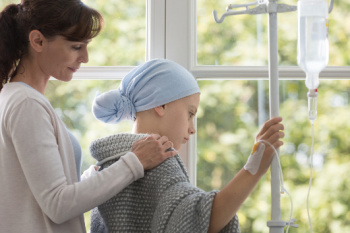Sexual Issues Need Attention in Female Childhood Cancer Survivors

About 1 in 5 female survivors of childhood cancer experience sexual problems as adults, according to new research in the Journal of Sexual Medicine.
For a comparison group of women without a history of cancer, the rate was about 1 in 10.
When they reach adulthood, many childhood cancer survivors face health issues related to their cancer or its treatment. Sexual problems can be especially troublesome, as treatment often occurs during a child’s sexual development.
The study included 936 women who had been treated for childhood cancer at St. Jude’s Children’s Research Hospital in Memphis, Tennessee. All of the women had been diagnosed with cancer at least 10 years before the study, and on average, they were about 31 years old. Two hundred twenty-four women were not sexually active.
The most common forms of childhood cancer among the participants were leukemia, lymphoma, soft tissue tumors, renal tumors, and central nervous system tumors, the authors said. About 85% had undergone chemotherapy treatment. Just over half had had radiation, and 15% had had pelvic surgery.
Another 122 women participated as a control group. They had not had cancer.
All of the women filled out questionnaires regarding their sexual function, health-related quality of life, body image, psychological health, and relationship satisfaction.
Almost 20% of the survivors had some degree of sexual dysfunction. Problems were more frequent for women aged 35 and older as well as those with depression. Low sexual desire, orgasm difficulties, and uncomfortable intercourse were most commonly reported.
Only 3% of the survivors with sexual problems said they had received treatment. The authors encouraged healthcare providers to consider the possibility of sexual dysfunction in their patients who had survived childhood cancer.
“Addressing this important problem has potential to improve mental health and enhance overall quality of life,” they wrote.
Resources
The Journal of Sexual Medicine
Bjornard, Kari L., MD, MPH, et al.
“Psychosexual Functioning of Female Childhood Cancer Survivors: A Report From the St. Jude Lifetime Cohort Study”
(Full-text. Published: July 25, 2020)
https://www.jsm.jsexmed.org/article/S1743-6095(20)30679-2/abstract
You may also be interested in...
Other Popular Articles

What Is the Average Penis Size?
If you have ever wondered how your penis compares to others in terms of size, you are not alone. Many men are curious to know how their penises stack up compared to the average. Unfortunately, general curiosity can sometimes give way to full-on obsession and anxiety about penis size. This can be an unhealthy and often unnecessary fixation, especially because most men who think their penises are too small have perfectly normal-sized penises.

What Is Jelqing, and Does It Actually Work?
The term “jelqing” refers to a set of penis stretching exercises that some believe can make the penis bigger. Although the practice has gained attention and popularity in blogs and internet forums in recent years, there is no scientific evidence that it is an effective way to permanently increase the size of one’s penis. In fact, in some cases, jelqing may actually cause damage to the penis, so it is a good idea to get all the facts before setting off to try it.

What Is Sensate Focus and How Does It Work?
Sensate focus is a technique used to improve intimacy and communication between partners around sex, reduce sexual performance anxiety, and shift away from ingrained, goal-oriented sexual patterns that may not be serving a couple.

Can Sex Reduce Menstrual Cramps?
The SMSNA periodically receives and publishes ‘guest editorials.’ The current article was submitted by Mia Barnes, a freelance writer and researcher who specializes in women's health, wellness, and healthy living. She is the Founder and Editor-in-Chief of Body+Mind Magazine.
Having sex while you experience menstrual cramps is healthy and can provide significant benefits. While it might not be the first activity that comes to mind when your PMS or period cramping begins, many people enjoy sex to reduce menstrual cramps, experience increased pleasure and benefit from other advantages. Learn more about having sex while menstrual cramps are happening and how it can help your body.

How Long Does It Take the Average Man to Ejaculate?
On average, it takes a man between 5 to 7 minutes to orgasm and ejaculate during sexual intercourse.

Can Sex Throw off Your Vaginal pH Balance?
The SMSNA periodically receives and publishes ‘guest editorials.’ The current article was submitted by Mia Barnes, a freelance writer and researcher who specializes in women's health, wellness, and healthy living. She is the Founder and Editor-in-Chief of Body+Mind Magazine.
Your vagina is a pretty powerful organ. It is a pathway for menstrual blood and babies. It also is a main player in sexual intercourse. You might hear about your vagina’s pH and worry that yours is at risk. Here’s what to know about vaginal pH, including the impacts sex could have.
You are prohibited from using or uploading content you accessed through this website into external applications, bots, software, or websites, including those using artificial intelligence technologies and infrastructure, including deep learning, machine learning and large language models and generative AI.

